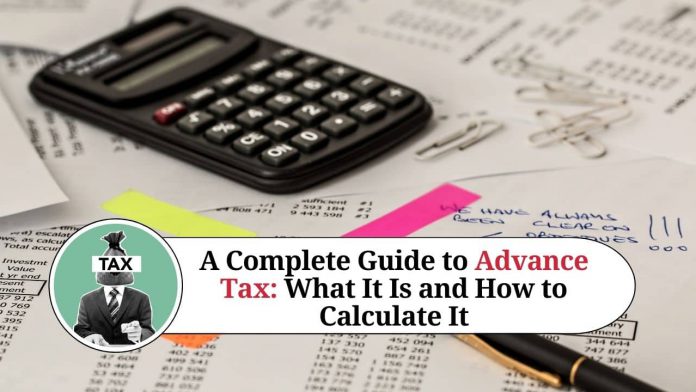Advance tax is a form of tax payment that is required to be paid in advance by taxpayers in India. It is a form of income tax that is levied on individuals, companies, firms, and other entities that have a liability to pay income tax. In this article, we will take a closer look at what advance tax is, how it is calculated, and who is required to pay it.
What is Advance Tax?
Advance tax is a method of paying income tax in advance during the financial year. It is a means of paying your tax liability as and when you earn the income, rather than waiting until the end of the year. The income tax department requires taxpayers to pay advance tax if their tax liability is more than Rs. 10,000 for a financial year. The tax is paid in installments throughout the year, instead of paying the full amount at once.
Who is Required to Pay Advance Tax?
As per the Income Tax Act, of 1961, the following entities are required to pay advance tax:
- Individuals: If an individual’s total tax liability for the financial year is Rs. 10,000 or more, they are required to pay advance tax.
- Freelancers and Self-Employed Individuals: Freelancers, self-employed individuals, and professionals such as doctors, lawyers, and chartered accountants, are required to pay advance tax if their tax liability for the financial year is Rs. 10,000 or more.
- Companies and Corporates: Companies and corporates are required to pay advance tax in installments, based on their estimated tax liability for the financial year.
- Firms and Partnerships: Firms and partnerships are required to pay advance tax in installments, based on their estimated tax liability for the financial year.
How is Advance Tax Calculated?
The advance tax is calculated based on the estimated income for the financial year. The tax liability is calculated after deducting any TDS (Tax Deducted at Source) from the estimated income. The following is the schedule for payment of advance tax:
- Up to 15% of the estimated tax liability by 15th June
- Up to 45% of the estimated tax liability by 15th September
- Up to 75% of the estimated tax liability by 15th December
- Up to 100% of the estimated tax liability by 15th March
It is important to note that if the taxpayer fails to pay the advance tax as per the schedule, they will be liable to pay interest at the rate of 1% per month under section 234B of the Income Tax Act, 1961.
How to Pay Advance Tax?
The advance tax can be paid through any of the following methods:
- Online: The taxpayer can pay the advance tax online through the income tax department’s website.
- Bank Challan: The taxpayer can also pay the advance tax by submitting a bank challan at any authorized bank.
- E-Payment: The taxpayer can also pay the advance tax through e-payment using net banking, credit card, or debit card.
- Physical Challan: The taxpayer can also pay the advance tax by submitting a physical challan at any authorized bank.
Conclusion:
Advance tax is a form of income tax that is required to be paid in advance by taxpayers in India. It is a means of paying your tax liability as and when you earn the income, rather than waiting until the end of the year. It is important to note that if the taxpayer fails to pay the advance tax as per the schedule, they will be liable to pay interest under section 234B of the Income Tax Act, 1961.
Read more useful content:
- How to Save Tax on Salary
- Guide to Understanding Direct Taxes in India
- Filing Income Tax Returns
- GST E-invoice
Frequently Asked Questions:
Q: What is Advance Tax?
A: Advance tax is a form of tax payment that is required to be paid in advance by taxpayers in India. It is a means of paying your tax liability as and when you earn the income, rather than waiting until the end of the year.
Q: Who is required to pay Advance Tax?
A: As per the Income Tax Act, of 1961, the following entities are required to pay advance tax:
- Individuals
- Freelancers and Self-Employed Individuals
- Companies and Corporates
- Firms and Partnerships
Q: When is the Advance Tax due?
A: The advance tax is paid in installments throughout the year, as per the following schedule:
- Up to 15% of the estimated tax liability by 15th June
- Up to 45% of the estimated tax liability by 15th September
- Up to 75% of the estimated tax liability by 15th December
- Up to 100% of the estimated tax liability by 15th March
Q: How is Advance Tax Calculated?
A: The advance tax is calculated based on the estimated income for the financial year. The tax liability is calculated after deducting any TDS (Tax Deducted at Source) from the estimated income.
Q: What happens if I fail to pay Advance Tax?
A: If the taxpayer fails to pay the advance tax as per the schedule, they will be liable to pay interest at the rate of 1% per month under section 234B of the Income Tax Act, 1961.
Q: How can I pay Advance Tax?
A: The advance tax can be paid through any of the following methods:
- Online
- Bank Challan
- E-Payment
- Physical Challan




















